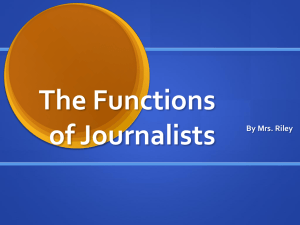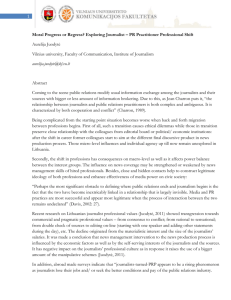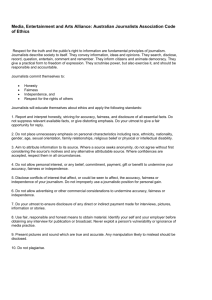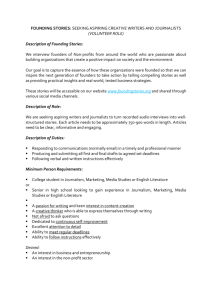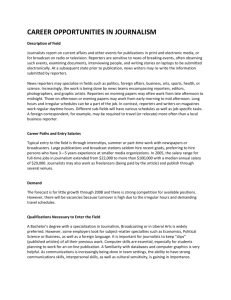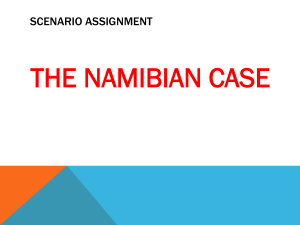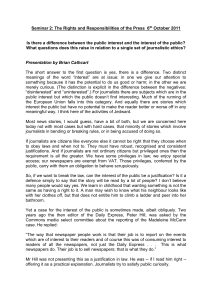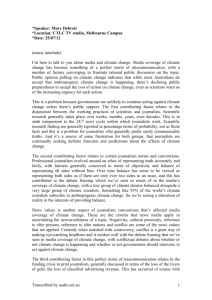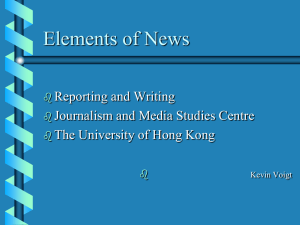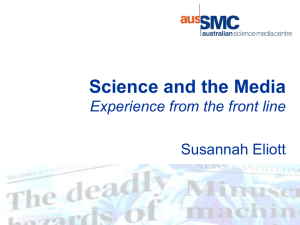A lecture by John Lister of Coventry University, England
advertisement
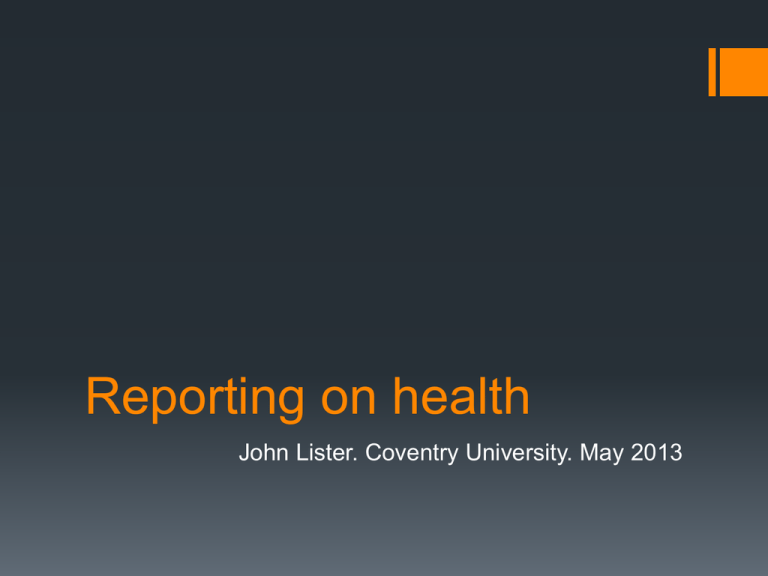
Reporting on health John Lister. Coventry University. May 2013 2 Why health coverage important NEWS stories abound, because HEALTH offers: World’s biggest industry $5 trillion-plus turnover World’s biggest employer Major political issue in every country Local, regional, national, international, global Social issue – defining national culture Scientific stories – medical research, impact of treatments and diseases etc Personal interests of news audiences: human interest stories; will I/grandma get treated? etc 3 News values and health Conflict of interest affecting reporters, editors and news media owners. Journalists want stories that count high in news values for their target audience They want good news on research and cures Happy to focus on bad news on health systems They want simple news (and therefore try to simplify sometimes carefully nuanced reports and findings) 4 Problems in health reporting Not part of journalists’ basic training Surveys show most news on health reported by non-specialists Even most specialist health reporters largely self taught AHCJ/KFF survey Reuters Institute survey HeaRT survey Health specialists no journalism training. Obstacles to involving journalists in further training Thinned out newsrooms and profit-oriented employers mean few resources and no encouragement for training Many journalists already in post making a living as health reporters without training Editors also lack health journalism training, happy with existing standards So we need to persuade journalists, staff & freelance to give up time & spend money to participate in extra training 5 6 Why does it matter? News media are the only source of information for most of general public Few health workers will be aware of issues outside their own sphere of activity (department, service, locality, specialism) Media responsibility to critique information, put in context, popularise and explain Misleading info can cause panic and impact on health (MMR) + policy (swine flu) 7 Accuracy in medical reports Many stories on medical research, science and new treatments based on press releases Core research and science is often simplified and “spun” for headlines by PR depts The result can be exaggerations, negative findings suppressed, misleading statistics, etc Much of the research conducted by profitseeking organisations: Universities seek profile, research grants and recruitment 8 Peer review not enough Even where science stories based on info from peer reviewed journals, problems remain Lancet editor Richard Horton has identified ten problems 1. Manipulation of research findings 2. Bias toward positive findings in sponsored studies 3. Undisclosed adverse data 4. Actively hiding negative data 5. Supplement publishing: Journal supplements often represent little more than informationlaundering operations for industry. Horton’s ten points 9 6. Undisclosed conflicts of interest: “the continuing privatisation of much of science threatens to make independent research almost impossible to do.” 7. Editorial kick-backs 8. Ghost-writing: pharmaceutical companies seed the medical literature with ghostwritten editorials, reviews, and opinion pieces: a company friendly expert is then paid to have his or her name appear on the article. 9. Continuing medical education: Industry is now a major sponsor of medical "education". A former editor of the NEJM, Marcia Angell, estimates that about 60% of CME in the US is paid for by industry. 10. Failure to align commercial with public interests. 10 Reporting: the basics Key issues for journalists: Access points for information Timely information for journalists under pressure in thinned-out newsrooms Range of information (Board papers, etc) not just occasional press releases on selected issues Transparency – not shrouding details with “business in confidence” Journos also need informed comment and analysis – need public access to information 11 Criteria to measure quality Gary Schwitzer/ healthnewsreview.org developed ten point checklist to identify strengths and weaknesses of reports on medical treatment and innovations In my view it is also important to scrutinise evidence and critique articles on health policy issues Recent example in England of Health & Social Care Act, poorly reported, public unaware 12 My ten points on policy 1. Does the story ask whether there is any concrete plan and timescale for implementation? 2. Does it explain costs & identify funding? 3. Does it question whether the policy based on ideology or addressing a genuine problem? 4. Does it seek evidence of the effectiveness of the policy and that it has been used successfully elsewhere? 5. Are the downsides of the policy explored? 13 My ten points (6-10) 6. Does the story unreasonably suggest a consensus in favour of the policy and ignore opposing views? 7. Are the claimed benefits of the policy explored and questioned? 8. Does the story largely stem from official press releases promoting the policy? 9. Are potential conflicts of interest explored? 10. Are alternative policies discussed? Our aim: improved health journalism 14 Not telling people what to say, but keen to ensure CRITICAL approach Break dependence on official handouts and press releases Offer links, resources and suggest how journalists can develop their own lists of useful contacts for independent comment. Demand increased transparency from health care commissioners and providers 15 Prioritising topics for further training: journalists’ choice Medical Research and Science The business/economics of health care Health policy Health care quality and performance Global Health Consumer/Lifestyle health The politics of health care Health disparities The workings of publicly financed health programs 16 Extra skills most in demand How to evaluate conflicts of interest How to interpret medical research reports How to understand statistics How to understand hospital and other financial reports How to map health conditions, services and the like in my community How to do multimedia reporting How to search for medical information online How to work with Excel or other analytical software How to understand public opinion polls and surveys 17 Resources for learning Training packages varied according to expressed interest in survey Quite wide differences & contradictions Our survey showed the preference was for taught sessions backed up by online resources rather than purely online courses Again different countries face different preferences/time constraints: UK least favourable to 4-day course 18 Big gaps: how can they be filled? Two thirds overall (and more than half in every country) felt that the level of coverage of Global Health was inadequate, 80% of Romanians, 76% of British and 72% of German journalists felt there was not enough Global Health reporting: but only 30% of Romanians, 18% of British and 12% of Germans wanted training on Global Health. The subject that scored the highest for “too much” coverage (37%) and the lowest for “not enough” (14%) was Consumer and Lifestyle health. 19 Journos unimpressed EU Health journalists were strikingly unenthusiastic about the quality of specific areas of health journalism by their colleagues At most 39% regarded coverage of ANY of the topics as either good or excellent Five of eight topics scored less than 30%. Especially low numbers regarded reports on The Business and Economics of Health Care, The Politics of Health Care and Health Disparities as excellent. 20 What next? Campaign with NUJ to: survey prevalence of health specialists in newsrooms, campaign for each newsroom to have health reporter Develop short course options (Coventry Uni) E-book on health journalism www.europeanhealthjournalism.com Develop a blog sharing experience, tips and knowledge on health reporting Other ideas & suggestions EU/Canada/US/world! 21 Thankyou! Dr John Lister J.lister@coventry.ac.uk @JohnRLister www.healthemergency.org.uk www.europeanhealthjournalism.com

